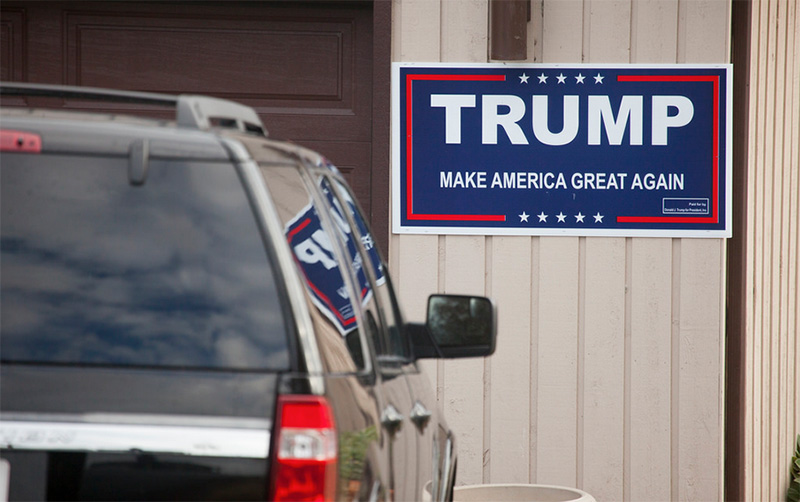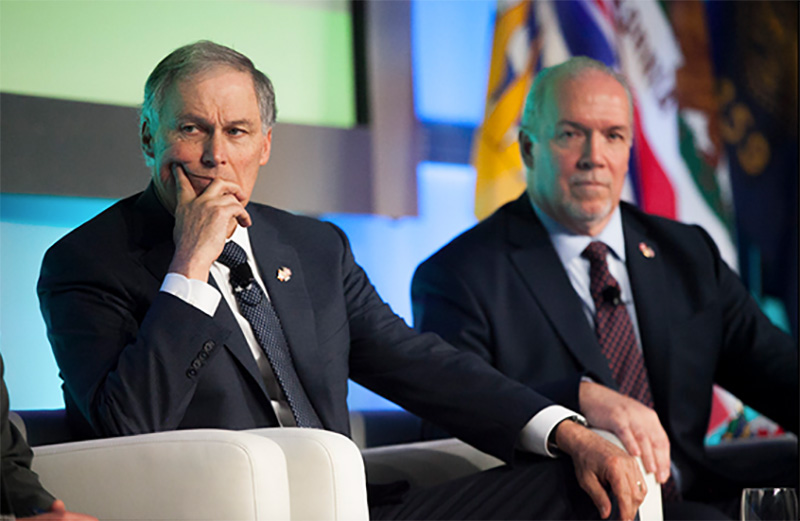A poll of Canadians released in November listed two top concerns. In order they were U.S. President Donald Trump and climate change.
If nerves here are a bit calmer two years from now, the reason might be Jay Inslee.
That’s assuming he runs for president, wins and carries through on the mission he says drives him most as governor of the state of Washington: climate change.
British Columbians may be familiar with Inslee, as he’s been popping up in their news lately. He’s a big booster of a high-speed rail line linking Portland to Vancouver. In March, he weighed in on the Trans Mountain pipeline, saying he hoped it would be stopped. And in December Inslee lent his support to the climate plan unveiled by the BC NDP government.
Now rumours are flying that Inslee will run to be the Democrats’ next presidential candidate.
If he were to become president of the United States, Inslee would be the first to hail from Cascadia, a bioregion that stretches from Alaska to Northern California. Nature doesn’t recognize international boundaries, which is why Inslee often finds himself working on environmental issues that involve British Columbia.
Inslee recently pledged $1.5 billion for what he called a “herculean” effort to save endangered orcas swimming the Salish Sea. He has proposed banning commercial whale watching for three years and, to howls from Republicans, tearing down dams that impede salmon that nourish the orcas.
Inslee’s spokesperson said this week that the governor is still officially undeclared, but the 67-year-old has been behaving very much like one testing the waters. He’s set up an exploratory committee and given several national U.S. media interviews suggesting Americans are ready to support a presidential candidate with a strong emphasis on deep climate action.
“We have a message that’s based on the promise of restoring America, a promise to fight the first existential threat to this nation’s health and security, and that’s climate change,” he told MSNBC on Saturday.
“We know that the energy in our party, the young people in our party, understand this threat, and that if we have someone who issues a clarion call to engage the optimism and the can-do spirit of this country, we can and will defeat climate change.”
Occasionally, he hints that he’d be the one to win the White House.
“I believe the only hope for America is to nominate a Democratic governor who will make climate change the paramount issue in this [presidential] race, and will pledge to the American people that they will make it the first and foremost effort to enlarge and spark the creative genius of this country to defeat climate change. And I will do that,” he told MSNBC last week.
“I believe [climate change is] a potentially winning issue to run on,” he also told Rolling Stone magazine.
How did he arrive at that conviction?
A decade ago, then a member of Congress, Inslee took a tour of the Keyport naval base in Washington. Watching a wall-size war games monitor that felt to him like a mix of Dr. Strangelove and the world’s largest video game, Inslee was overwhelmed by the technical sophistication and cost of a real-time torpedo battle simulation being presented to him.
“It evoked awe and dismay. But I choked both down,” fearing how a visiting congressman ought to suppress emotions, he wrote in his 2008 book, Apollo’s Fire.
Then in a flash it hit him. What if America’s military industrial complex could be directed by the White House to solve climate change? He started asking base officials questions, like whether the skills needed to maintain naval pumps were transferable to geothermal development? “Somewhat to my surprise, several of the managers lit up at the idea,” he recalled.
“Those Pentagon engineers got it. The thought struck me that we need a response even more like the military one in [the Second World War] than the scientific one in the Apollo Project,” he wrote.
In the years since, Inslee has tasted executive power. Compared to when he was a member of Congress, Inslee says he can actually get things done as governor.
“It’s the difference between sitting on a couch and watching a fairly interesting sitcom... [versus] making history,” he told CNN’s David Axelrod. “A governor can do more in an hour than a member of Congress can in two or three years.”
Inslee says a president should use that power to inspire and direct a transformative response to the “existential threat” of climate change in a push not unlike Kennedy’s space program or the mobilization in the Second World War. He wants to green America’s economy with massive spending and private sector incentives. “Americans of all stripes — liberals, conservatives and Red Sox fans — are uneasy about our reliance on oil,” he wrote.
The Apollo moon program 50 years ago had funding equal to $18 billion a year in today’s dollars, he wrote, whereas the federal government’s R&D budget for energy is just over $3 billion.
“Kennedy got us to the moon. The current energy budget will not get us anywhere but to the next high-priced gas station.”
University of Washington political scientist Mark Alan Smith notes that Inslee is one of 50 presidential hopefuls.
“If you talk to county party chairs in Iowa or heads of chambers of commerce in New Hampshire, there are tons of politicians from all over the country who go to those two states to give speeches, to meet people. They’re testing the water, finding out, ‘Do I have a message that could resonate here?’” he said.
Whatever Inslee’s chances, Smith believes the governor is helping ensure that bold climate action is a litmus test for a Democratic nominee for president. Elizabeth Warren, Bernie Sanders and Joe Biden are all making climate policy a defining issue in the 2020 race. Some in the party, like Bronx Congresswoman Alexandria Ocasio-Cortez, are also calling for a “Green New Deal” — a massive federal investment in clean energy.
So does Inslee have what it takes to deliver that agenda in the White House?
He has a good story to sell: a basketball champion who married his high-school sweetheart; early success at winning an improbable rural race against a Republican; his governorship of one of the fastest growing state economies; and a track record of strong environmental positions.
He opposes the Trans Mountain pipeline expansion in British Columbia, legislated the end of open-net salmon fish farms on his coast and claims to have overseen an expansion of clean industries. “Look, we’re growing clean energy jobs like crazy in small-town rural Washington, where I cut my teeth, because we understand how to connect with those voters,” he told MSNBC.
And as chair of the national Democratic Governors Association, he took credit for overseeing the “biggest Democratic gubernatorial pickup in 36 years” — the flipping of seven seats to the blue column in the U.S. midterms.
Closer to home Inslee has proven himself an “effective executive as a governor,” said Cornell Clayton, a political scientist and director of the Thomas S. Foley Institute at Washington State University this week. “He’s got a well-run state, balanced budgets, strong economic growth, a pretty good environmental record, and for him to be successful, that’s the kind of case he’s got to make.”

He’s also a well-known scrapper with President Donald Trump, winning headlines early last year for criticizing the president in a live TV exchange about Trump’s musings on equipping teachers with pistols to prevent mass shootings.
Washington Gov. Jay Inslee and President Trump debate over arming some teachers in the wake of the Parkland school shooting https://t.co/dlGeAcGoi7
— CNN Politics (@CNNPolitics) February 26, 2018
Inslee and his state attorney also sued the Trump White House over the Muslim travel ban. The case led to the presidential order getting blocked by the courts.
On the issue of climate, and on the heels of another devastating West Coast wildfire season, Inslee was particularly fierce. “We are seeing in real time a disaster movie in slow motion that we are now living through... and we have a climate denier in the White House,” he told CNN.
Some observers believe Inslee’s laser focus on climate and clean jobs might help him compete in the Democratic presidential nomination process, but it won’t help him in a general election. “I know he’s pro-environment, a position he thinks will get him to the White House. He’s mistaken,” wrote conservative commentator Jason Rantz with AM770 radio in Washington.
“People may care about the environment, but they vote for candidates based on their positions on a whole host of issues they find more important, like the economy and national security. Environmental positions are seen as a bonus to progressive voters and virtually anyone Inslee would run against will be strong on the environment.”
Rantz says Inslee’s failure to win a November 2018 vote on a proposed carbon tax in Washington state sank his presidential ambitions, especially one based so heavily on climate change action.
Yet Democrats appear eager to embrace a climate change candidate. Inslee is fond of referring to a September poll showing that among 500 Democrat Iowa caucus goers, climate leadership scored as the second-highest desired presidential quality (89 per cent), after healing America’s racial divide (91 per cent). The small agricultural state is hugely influential in the early stages of presidential nominations.
Inslee believes his country can be motivated to adopt climate action if it is framed as a clean-job-creating ambition in the face of threat that Americans are now beginning to see and feel with increased wildfires, storms and droughts.
“We are proud of our place in the world because we’ve led the world in inventing democracy and saving it from fascism,” he said recently. “This is not about talking about the level of acidity. It’s about talking about the level of our ambition, and the level of our commitment to our kids and the level of our sense of optimism.” ![]()
Read more: Politics

















Tyee Commenting Guidelines
Comments that violate guidelines risk being deleted, and violations may result in a temporary or permanent user ban. Maintain the spirit of good conversation to stay in the discussion.
*Please note The Tyee is not a forum for spreading misinformation about COVID-19, denying its existence or minimizing its risk to public health.
Do:
Do not: